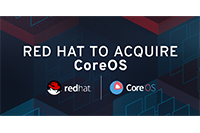Welcome,
Log in to your Red Hat account
Your Red Hat account gives you access to your member profile and preferences, and the following services based on your customer status:
- Customer Portal
- Red Hat Connect for Business Partners
- User management
- Certification Central
Not registered yet? Here are a few reasons why you should be:
- Browse Knowledgebase articles, manage support cases and subscriptions, download updates, and more from one place.
- View users in your organization, and edit their account information, preferences, and permissions.
- Manage your Red Hat certifications, view exam history, and download certification-related logos and documents.
Your Red Hat account gives you access to your member profile, preferences, and other services depending on your customer status.
For your security, if you're on a public computer and have finished using your Red Hat services, please be sure to log out.
Log outRed Hat Blog
The Friday Five is a weekly Red Hat® blog post with 5 of the week's top news items and ideas from or about Red Hat and the technology industry. Consider it your weekly digest of things that caught our eye.

IN THE NEWS:
CNBC - Red Hat pays $250 million for CoreOS, a start-up that sells Google-developed technology
The move gives Red Hat a prominent name to keep commercializing hot open-source software as part of its arsenal. By combining CoreOS's complementary capabilities with Red Hat's already broad Kubernetes and container-based portfolio, including Red Hat OpenShift, Red Hat aims to further accelerate adoption and development of the industry's leading hybrid cloud platform for modern application workloads.
More than four years ago Red Hat made a bet. We bet big on containers as the future for how applications would be built, deployed and managed across the hybrid cloud. We bet on the emergence of new industry standards for container runtime, format, orchestration and distribution.

CUSTOMER SUCCESS:
Fastweb Delivers Hybrid Cloud and Storage Services to Enterprises Faster with Red Hat
Fastweb, a major Italian telecommunications operator, has deployed Red Hat CloudForms and Red Hat Ceph Storage to deliver more scalable, efficient and flexible cloud services to its enterprise customers, faster. Fastweb aims to streamline its cloud management and storage by taking advantage of the high degree of automation offered by Red Hat technologies.
For the second year in a row, Red Hat Ceph Storage has been named as a finalist in Storage Magazine and SearchStorage’s 2017 Products of the Year competition. Red Hat Ceph Storage is an open, massively scalable storage solution for modern workloads like cloud infrastructure, data analytics, media repositories, and backup and restore systems.
At Red Hat we like to say, "Containers are Linux—Linux is Containers." Traditional containers are processes on a system that usually have the following three characteristics: resource contraints, security constraints and virtual separation. In this article, Daniel Walsh provides some historical context about container runtimes.









